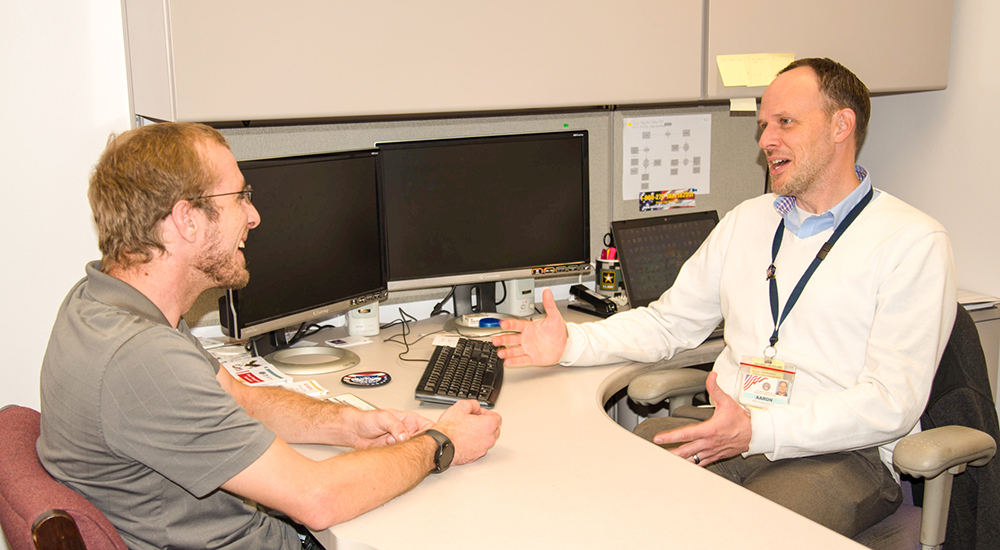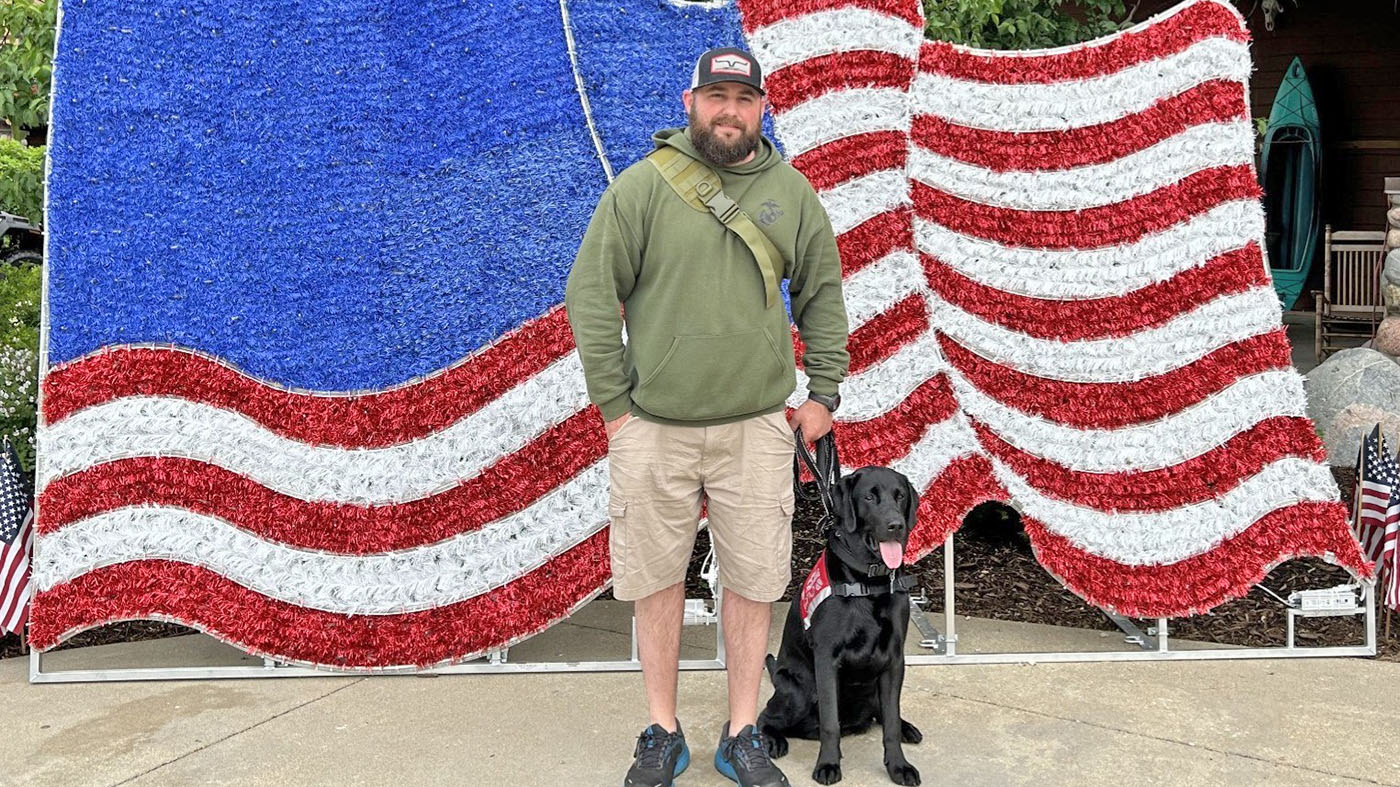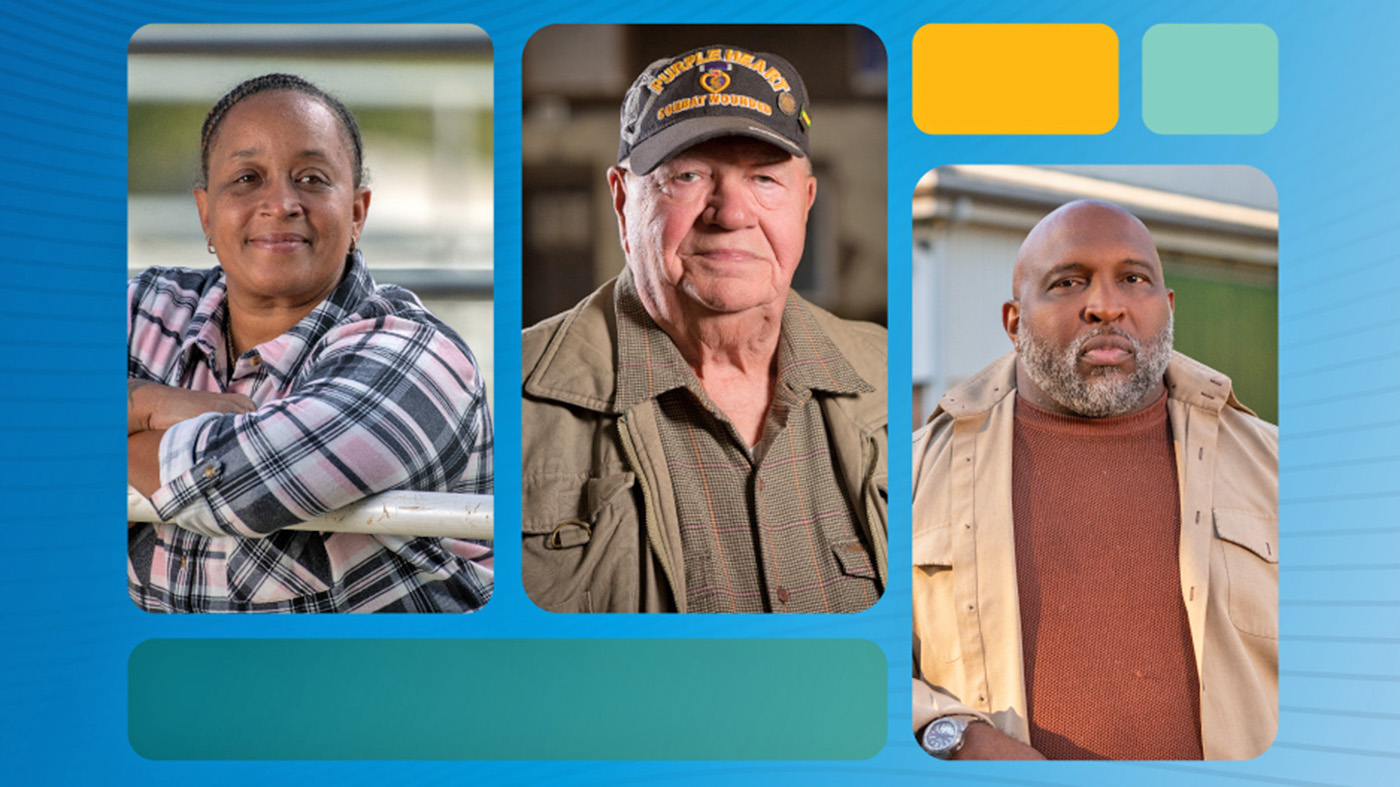Many Veterans want to pursue higher education when they get out of the armed forces. And whether you served four years or retired after decades of service, heading back to school can be a daunting task; Veterans face their own unique challenges when pursuing a degree.
VA’s Veterans Integration to Academic Leadership program or VITAL program is helping Veterans face that daunting task.
VITAL exists to serve all student Veterans. That could be student Veterans headed back to school on the GI Bill, or those using vocational rehabilitation and other programs. VITAL’s mission is to aid Veterans in overcoming obstacles and achieving academic success.
The coordinator of VA Salt Lake City Health Care System’s (VASLCHCS) VITAL program, Dr. Aaron Ahern (pictured above, right, with student Veteran Joseph Atkin, left), says VITAL accomplishes this in three ways: 1) outreach to student Veterans 2) provide mental health clinical care on campus to make it more accessible 3) training school faculty and staff.
VITAL is a collaborative effort between the schools, the Veterans Health Administration (VHA), Veterans Benefits Administration (VBA) and state and local governments to ensure student Veterans get the tools they need to succeed. The VITAL program offers a lot of tools for student Veterans, but at the center of the VITAL toolbox is the peer-to-peer mentor.
A battle buddy for higher education
The mentors are fellow student Veterans who get significant training through VA in a variety of services, including benefits, mental health and suicide prevention. The peer mentors conduct most of the outreach for the program and are the go-to persons for the student Veterans.
“Among our Veterans, in general, there is a stigma about asking for help and not wanting to appear weak,” says Dr. Ahern. “But if they can hear it from another student Veteran, it can make it kind of normal.”
The mentors reach out to new student Veterans, get them into their offices, get a sense of the new student Veteran needs and then periodically touch base with them. The mentors help Veterans enroll in VHA health care, determine if they should be using vocational rehab or the GI bill and help them get into Veteran Service Officers to make claims or learn about making a claim. Most importantly they have the Veterans’ backs.
“They are getting the one-on-one attention they deserve,” says Travis Murphy, a Marine Corps Veteran, peer-to-peer mentor and Weber State student. “I want to say I see myself as an advisor and peer, and someone, they can come to and talk about their classes if they are struggling.”
Travis is not only a mentor; he also benefited from the program. Serving as a work study at Weber State’s Veterans Services Office, a VITAL mentor let him know that he was enrolled in VHA health care, something Travis did not know. That led to primary health care appointments and mental health counseling through the VITAL program on campus at Weber State.
More than just outreach
The mentors are so much more than just outreach specialists. The mentors “build that relationship and trust and then start asking them specifically about how they are doing,” says Dr. Ahern. “And then it is easier for a Veteran to disclose, they’re struggling. Then the mentors get those services that are specific to their need.”
A common need is mental health care. The mentor will connect the student Veteran with VA clinicians and best of all, a student Veteran doesn’t even have to leave campus. “We do a full gamut of outpatient services,” says Dr. Ahern. “We just do them out there at the school. They don’t need to come to VA; they can just come over to us and then head out to class.”
Dr. Ahern also looks at the entire program as a suicide prevention program.
“For some people, they hear that and they think someone who is in an active crisis mode,” he says. “We do that, but what I think is more important and more valuable with VITAL is that we are trying to get people to be successful at life and reengaging with something that is meaningful for them.”
Dr. Ahern says the VITAL program helps the Veterans deal with issues before they reach that crisis level, but if they do, mentors are trained to address suicide both from the crisis side and the preventative side.
The mentors “may not know all the risk factors,” says Dr. Ahern, “but they are trained on how to screen for suicide risk factors. Then they know what to do with that.”
“We will spend 2-3 hours sitting down and talking to Veterans if need be,” says Travis, “to make sure that they are okay and that they can walk out of this office without any threat to their life.”
And if they are not okay, the mentors know who to call to get the Veteran the support they need. Currently, the VITAL program is offered at 23 VA medical centers.
“The schools allow us to be there,” notes Dr. Ahern. “They are gracious hosts to have kind of a VA embassy on campus.”
But it is much more than just that. Dr. Ahern says it’s a collaboration with the schools. The schools help put VA in touch with student Veterans.
VITAL Successes
“When a Veteran comes back and says I passed,” says Travis, “it is a great feeling because I am seeing my influence is actually positively affecting somebody.”
One of the success stories involved a peer mentor calling a student Veteran for an outreach call. During the call, the Veteran divulged that he was struggling, that he had a lot of recent losses in his life and was thinking of dropping out of school. While the mentor talked further with the Veteran, the Veteran let the mentor know he was having suicidal thoughts.
The mentor with the help of Dr. Ahern got the Veteran the treatment he desperately needed. However, their help didn’t stop there, they also reached out the Veteran’s school and got him academic support.
“All of that,” says Dr. Ahern, “because a peer reached out to him.”
Learn more about the VITAL program.

Photos by: Valerie Sterrett, Weber State University.
Topics in this story
More Stories
Marine Corps Veteran Sean Smith was paired with his service dog Hawk, which has inspired him to spread messages of hope.
Stay ahead of the weather. VA has several virtual care resources to help you manage your health care this winter.
Preparing before a suicide crisis happens can help you get through it safely.









Cool stuff.